Topic: DUI - Driving under Influence

Interview of Rochelle Chronister, January 22, 2015
Interviewed by Burdett Loomis
Rochelle Chronister quickly rose to a leadership position after her election in 1978. She was responsible for recruiting many Republican women to the legislature. She talks in the interview about her job as Assistant Majority Leader and recruitment. Her description of how the Appropriation committee works shows how she became interested in SRS from handling their budget, and that led to becoming Secretary of SRS under Governor Graves. There is one example of her research skills in developing a new program on mediation. She downsized SRS as Secretary and worked on changing the culture of Show Morea highly bureaucratic organization. She worked to ensure that her female colleagues were included and worked across the aisle on numerous measures. She concludes the interview by talking about her family and how they responded to her being away so much. She once chartered a plane to get home in time to attend her daughter's tea. That Chronister was an effective legislator and politician is clear from reading this interesting interview. Show Less
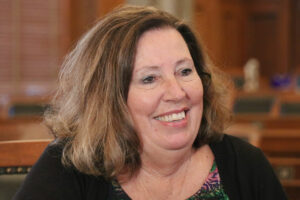
Interview of Darlene Cornfield, October 9, 2020
Interviewed by Patty Clark
Former State Representative Darlene Cornfield reflects on her six sessions in the Kansas House representing the 90th House District (Sedgwick Co.). She describes the issues that come back year after year and the challenges faced by a new legislator. She identifies the difficulties faced by conservatives at a time when the Republican party was undergoing an ideological change. Cornfield observes that the citizen legislature is most effective but did not favor term limits.
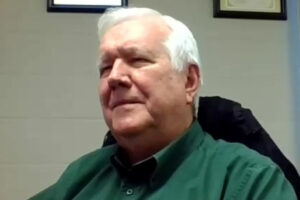
Interview of Mike Dealy, November 24, 2020
Interviewed by Rex Buchanan
In this 2020 oral history interview, Mike Dealy discussed his observations of Kansas water policy implementation during his career as the Manager of a Groundwater Management District (GMD). He reflected on the degree to which water policy permeates all aspects of society and politics. He recalled how the GMD Board's interest in water quality added a dimension to water management that didn't exist in all GMDs. He also noted that changes in the composition of the GMD Board of Directors had an impact on policy development and reflected on the importance of broad representation in the elected Board of Directors. Show More He concluded that broad representation ideally can result in cooperation among all water users in a GMD, irrigators, municipalities, and industries, which is key to a successful management plan. Show Less
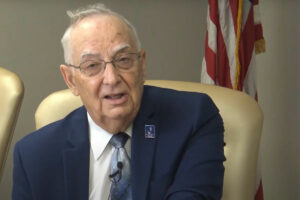
Interview of Dale Dennis, August 28, 2020
Interviewed by Andy Tompkins
People interested in the development of education policy in Kansas will find no better resource than this 2020 oral history interview with Dale Dennis, Deputy Commissioner of Education. The interview was conducted by Dr. Andy Tompkins, a former Kansas Commissioner of Education. During the interview, Dennis speaks candidly about policy development, identifying the issues and the legislators who were intrinsically involved. The interview covers the 1972 lawsuit which was the first dealing with issues of equity in school funding. Twenty years later, a 1992 school finance lawsuit again challenged the lack of equalization which rendered the formula unconstitutional. Dennis explains Show Morein detail the process by which the Legislature, Governor Joan Finney, Speaker Marvin Barkis, and others went about addressing the Court's concerns. By 2000 the Legislature had again failed to fund the school finance formula fully and the Montoy lawsuit arose. Another case, Gannon, began in 2010. This time the problem was the adequacy of the funding to meet constitutional requirements. Moving on from school finance lawsuits, the interview covers school consolidation and related issues of local control. Dennis explains why he started offering budget workshops to school administrators, including the development of software and the use of computers. This interview includes a brief discussion of the 1999-2000 legislation that moved state oversight of community colleges and technical schools (later termed technical colleges) from the Kansas Department of Education to the Kansas Board of Regents.
Highlight -- short excerpt from the interview
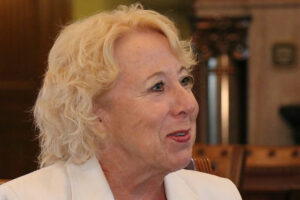
Interview of Christine Downey, August 2, 2019
Interviewed by Dale Goter
Former State Senator Christine Downey recalls her three terms in the Kansas Senate (1993-2004) during her 2019 oral history interview. With her background as a teacher, education issues were important to her as the era of school-funding litigation continued. She was involved in water-related policy making, in particular at the nexus of water quality and agricultural practices. She recalls her service in the Senate and on the Kansas Board of Regents first developing the policy and then implementing fundamental changes to the postsecondary education system. Ms. Downey discusses numerous instances of working across the aisle Show Moreto accomplish policy objectives that did not break on strict party lines. Show Less
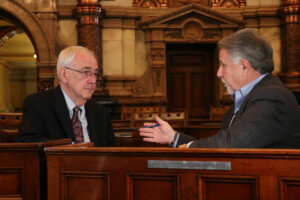
Interview of Tim Emert, October 4, 2019
Interviewed by Jim McLean
Tim Emert's interview covers his Senate career in the last decade of the Twentieth century, following passage of a markedly different school finance bill in 1992 and with a divided Republican caucus in the Senate--a time of big change. Emert stepped into the chairmanship of the Senate Judiciary Committee immediately and later moved up to become Senate Majority Leader, elected to that post with a one-vote margin. In this oral history interview he described coalitions he formed to get legislation passed. As Judiciary chair, Emert dealt with both the death penalty, which he personally opposed, and a Show Morebill restricting late term abortions which no one liked but which passed anyway. He worked with Christine Downey to get a major policy change regarding community colleges. Emert also described his work on the State Board of Education and later, the Board of Regents. He characterizes himself as neither moderate or conservative, but as "a realistic Republican." He talked about his time as Majority Leader being a "juggling act" trying to maintain communication with the conservative House Speakers (Shallenburger and Jennison) and the Senate. He explained the tension in having both the poorest and richest counties in his district and trying to provide equalization of school funding. Emert also talked briefly about on the renovation of the Capitol and the renovation of Cedar Crest (the Governors Mansion). Show Less

Interview of Jack Euler, April 22, 2015
Interviewed by Burdett Loomis
Jack Euler talks about his ten years in the Legislature and the formal and informal leadership dynamics he witnessed. Euler notes the changes in the Legislature that began with initial implementation of the one person, one vote principle as the basis for legislative districts rather than the county-based system that had existed since statehood. He describes how redistricting gradually changed the urban-rural dynamic of the House. Euler also reflects on the influence of lobbyists on both legislation and leadership in the House.

Interview of H. Edward (Ed) Flentje, June 14, 2019
Interviewed by Rex Buchanan
During this 2019 oral history interview of Ed Flentje, he recalled the intricate work of developing a water planning process and applying good governance principles to a highly contentious issue that involved a variety of entities both inside and outside state government in the 1970s. The innovations in water regulation that grew out of the agenda of Governor Bennett, for whom Flentje served as Planing Director, were carried out and implemented by succeeding Governors, Carlin and Hayden. Flentje's description of water policy rising to prominence in the Bennett administration demonstrates how governors benefit from Show Morelistening to a variety of voices when developing policy agendas. Show Less

Interview of Lon Frahm, June 18, 2020
Interviewed by Rex Buchanan
In this 2020 oral history interview, Lon Frahm describes his involvement in groundwater policy development as a member of Northwest Groundwater Management District No. 4. During the 1990s, he challenged the zero-depletion policy (to take only the amount of water that will be naturally replenished). Frahm supported local control of water management. He observed that over the years control over water planning has shifted to state-level water agencies, particularly the Kansas Water Office, that are not “invested personally” in managing water in northwest Kansas. In his view, state Water Plan funding has resulted in spending that Show Moredoes not help farmers and other local interests. Frahm cites the importance of local culture in setting water policy using as an example the Local Enhanced Management District (LEMA) in Sheridan County. He notes that the success of that endeavor grew out of the shared values of the farmers and a local market for grain. Frahm argues that changes in water use will be very slow over time, and water use should not be held back because we cannot predict the future. Show Less
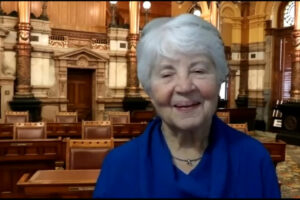
Interview of Sheila Frahm, November 13, 2020
Interviewed by Joan Wagnon
In this 2020 oral history interview, former Kansas State Senator Sheila Frahm reflects on her time in elected office from local school board to U.S. Senate. This interview was conducted on ZOOM with Frahm at her home in Arizona and the interviewer in Topeka. The interview begins with a discussion of an earlier (1991) interview conducted by a Washburn University professor that covers much of Frahm's background and her interest in education issues. It covers her life in Topeka in the early years of her service and how her family moved to Topeka with her for the session each year Show Moreand why. Frahm provides a unique point of view on the relationships between Governors and the Legislature. She discusses her decision to leave the legislature and run for Lt. Governor with Bill Graves and her subsequent appointment to fill a U.S. Senate vacancy when Bob Dole decided to run for President. This interview includes a segment during which Frahm talks about several issues in which she was involved: community colleges and out-district tuition and triple-trailers. During the interview Frahm reflects on her identity as a western Kansas legislator and how her roots, her up-bringing, shaped others' perceptions of her legislatively. She saw the years during which she served in the State Senate as very productive, citing school finance in 1992 and advances in higher education as two important policies that were enacted. The interview concludes with Frahm's reflections on the civility of the body, the importance of relationships to accomplish your goals, and advice to prospective candidates. Show Less
